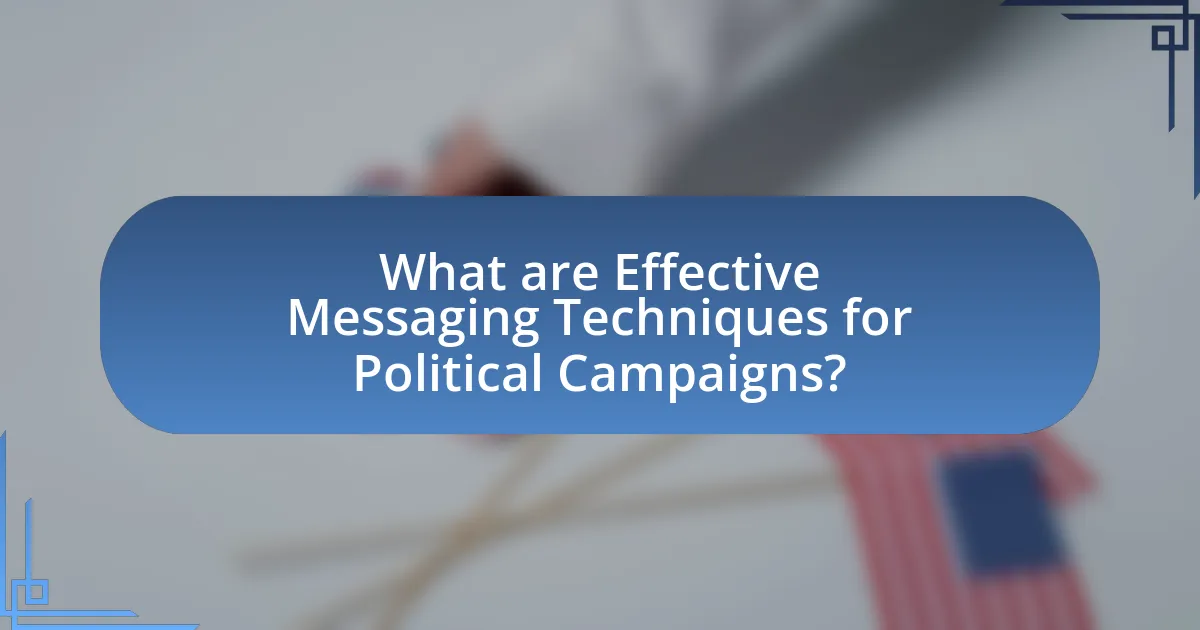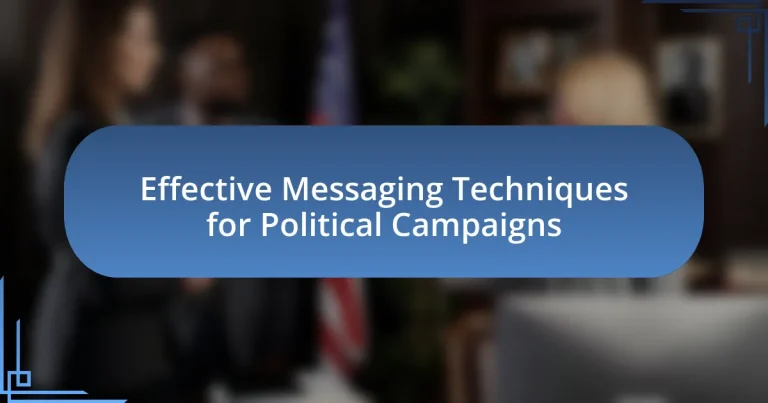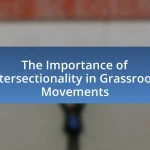Effective messaging techniques for political campaigns are essential for influencing voter perception and engagement. Key strategies include clear communication, emotional appeal, and targeted messaging tailored to specific demographics. The article explores how these techniques, supported by psychological principles, enhance voter persuasion and turnout, as evidenced by successful campaigns like Obama’s in 2008. It also discusses the importance of consistency in messaging, the role of social media, and best practices for crafting impactful messages, while highlighting common pitfalls to avoid. Overall, the article provides a comprehensive overview of how effective messaging can significantly impact political campaign success.

What are Effective Messaging Techniques for Political Campaigns?
Effective messaging techniques for political campaigns include clear and concise communication, emotional appeal, and targeted messaging. Clear communication ensures that the campaign’s core message is easily understood by voters, while emotional appeal connects with voters on a personal level, making the message more relatable and impactful. Targeted messaging involves tailoring the campaign’s message to specific demographics or voter groups, which increases relevance and engagement. Research shows that campaigns utilizing these techniques can significantly enhance voter persuasion and turnout, as evidenced by the 2008 Obama campaign, which effectively used targeted messaging and emotional narratives to mobilize diverse voter bases.
How do messaging techniques influence voter perception?
Messaging techniques significantly influence voter perception by shaping how candidates and their policies are viewed. For instance, the use of emotional appeals in messaging can create a strong connection with voters, leading to increased support. Research indicates that messages framed around fear or hope can elicit different responses; a study by the American Psychological Association found that fear-based messaging can mobilize voters but may also lead to disengagement if perceived as too negative. Additionally, the repetition of key messages enhances recall and can solidify a candidate’s image in the minds of voters, as demonstrated by the mere exposure effect in psychology, which suggests that familiarity breeds preference. Thus, effective messaging techniques are crucial in determining how voters perceive candidates and their platforms.
What psychological principles underpin effective messaging?
Effective messaging is underpinned by psychological principles such as the Elaboration Likelihood Model (ELM), social proof, and the principle of reciprocity. The Elaboration Likelihood Model suggests that individuals process persuasive messages through either a central route, which involves careful consideration of the arguments, or a peripheral route, which relies on superficial cues. Research indicates that messages that engage the central route lead to more enduring attitude change (Petty & Cacioppo, 1986). Social proof, the tendency to look to others for guidance in uncertain situations, can enhance message effectiveness by demonstrating widespread support for a candidate or policy. Studies show that individuals are more likely to adopt behaviors endorsed by their peers (Cialdini, 2009). Lastly, the principle of reciprocity, which suggests that people feel obliged to return favors, can be leveraged in messaging by offering value upfront, leading to increased support. These principles collectively enhance the persuasive power of political messaging.
How does emotional appeal impact voter engagement?
Emotional appeal significantly enhances voter engagement by creating a deeper connection between candidates and voters. When political messages evoke emotions such as hope, fear, or empathy, they can motivate individuals to participate in the electoral process. Research indicates that emotionally charged messages are more likely to be remembered and shared, leading to increased voter turnout. For instance, a study published in the journal “Political Psychology” found that emotionally resonant advertisements can boost voter mobilization by up to 20%. This demonstrates that emotional appeal is a powerful tool in effective political messaging, driving higher levels of engagement among the electorate.
What role does audience targeting play in messaging?
Audience targeting is crucial in messaging as it ensures that communication is tailored to specific groups, enhancing engagement and effectiveness. By identifying demographics, interests, and behaviors, political campaigns can craft messages that resonate with particular audiences, leading to higher response rates. Research indicates that targeted messaging can increase voter turnout by as much as 10%, demonstrating its significant impact on campaign success. This strategic approach allows campaigns to allocate resources efficiently, focusing on segments most likely to respond positively to their messages.
How can campaigns identify and segment their target audience?
Campaigns can identify and segment their target audience by utilizing data analytics, surveys, and demographic profiling. Data analytics allows campaigns to analyze voter behavior and preferences through historical voting data and social media interactions. Surveys provide direct insights into voter opinions and motivations, while demographic profiling categorizes potential voters based on age, gender, income, and education level. For instance, a study by the Pew Research Center found that targeted messaging based on demographic data can increase voter engagement by up to 20%. This approach enables campaigns to tailor their messaging strategies effectively, ensuring they resonate with specific audience segments.
What messaging strategies resonate with different demographics?
Messaging strategies that resonate with different demographics include tailored content, cultural relevance, and platform preference. For instance, younger voters often respond well to social media campaigns that utilize humor and visual storytelling, while older demographics may prefer traditional media with straightforward messaging that emphasizes trust and reliability. Research indicates that 70% of millennials engage more with brands that reflect their values, highlighting the importance of aligning messages with the beliefs of specific age groups. Additionally, ethnic minorities often respond positively to messaging that incorporates their cultural narratives, as evidenced by studies showing that culturally relevant campaigns can increase engagement by up to 50%. Thus, understanding the unique preferences and values of each demographic is crucial for effective political messaging.
Why is consistency important in political messaging?
Consistency is important in political messaging because it builds trust and credibility with the electorate. When political messages remain consistent over time, they reinforce the candidate’s values and positions, making it easier for voters to understand and relate to their platform. Research indicates that voters are more likely to support candidates who present a coherent narrative, as this consistency signals reliability and integrity. For instance, a study by the Pew Research Center found that 70% of voters consider a candidate’s consistency on issues as a key factor in their decision-making process. This demonstrates that consistent messaging not only enhances voter perception but also plays a crucial role in shaping electoral outcomes.
How does consistent messaging build trust with voters?
Consistent messaging builds trust with voters by creating a reliable and coherent narrative that aligns with their values and expectations. When political candidates or parties maintain a steady message, it reinforces their credibility and reliability, making voters feel more secure in their choices. Research indicates that voters are more likely to trust candidates who present a unified message across various platforms, as it reduces confusion and demonstrates commitment to their stated principles. For example, a study by the Pew Research Center found that 70% of voters prefer candidates who communicate clear and consistent positions on issues, highlighting the importance of messaging in establishing trust.
What are the risks of inconsistent messaging during a campaign?
Inconsistent messaging during a campaign can lead to confusion among voters, eroding trust and credibility. When a campaign presents conflicting messages, it creates uncertainty about the candidate’s positions and values, which can alienate potential supporters. Research indicates that 70% of voters are influenced by a candidate’s perceived consistency, highlighting the importance of a unified message. Additionally, inconsistent messaging can result in negative media coverage, further damaging the campaign’s reputation and effectiveness.
How can campaigns effectively utilize social media for messaging?
Campaigns can effectively utilize social media for messaging by creating targeted content that resonates with specific audience segments. This approach allows campaigns to engage users through tailored messages that address their interests and concerns, leading to higher engagement rates. For instance, a study by the Pew Research Center found that 69% of adults in the U.S. use social media, making it a vital platform for reaching voters. Additionally, using analytics tools to track engagement metrics enables campaigns to refine their messaging strategies in real-time, ensuring that content remains relevant and impactful.
What are the best practices for crafting impactful campaign messages?
The best practices for crafting impactful campaign messages include clarity, emotional resonance, and audience targeting. Clarity ensures that the message is easily understood, which is crucial for effective communication; for instance, using simple language can increase message retention by up to 70%. Emotional resonance engages voters on a personal level, as studies show that emotionally charged messages can increase persuasion rates by 20-30%. Audience targeting involves tailoring messages to specific demographics, which enhances relevance and effectiveness; research indicates that personalized messages can lead to a 50% higher engagement rate.
How can storytelling enhance the effectiveness of campaign messages?
Storytelling enhances the effectiveness of campaign messages by creating emotional connections that resonate with the audience. When narratives are employed, they engage listeners on a personal level, making the message more relatable and memorable. Research indicates that stories can increase information retention by up to 65% compared to facts alone, as demonstrated in a study published in the journal “Psychological Science” by researchers at the University of California, Berkeley. This emotional engagement not only captures attention but also fosters trust and empathy, which are crucial for influencing voter behavior.
What role do visuals play in political messaging?
Visuals play a crucial role in political messaging by enhancing emotional engagement and improving information retention among voters. Research indicates that visuals can increase message comprehension by up to 89% and retention by 65%, making them essential tools for conveying complex political ideas effectively. For instance, campaign advertisements that incorporate striking images or infographics are more likely to resonate with audiences, as they simplify information and evoke emotional responses, thereby influencing voter perceptions and decisions.
What common pitfalls should campaigns avoid in their messaging?
Campaigns should avoid ambiguity in their messaging, as unclear communication can lead to misunderstandings and disengagement from the audience. Clear and concise messaging ensures that the intended message is easily understood, which is crucial for voter engagement. For instance, a study by the Pew Research Center found that 70% of voters prefer straightforward messages over complex ones, highlighting the importance of clarity. Additionally, campaigns should steer clear of negative messaging that attacks opponents without providing constructive alternatives, as this can alienate potential supporters. Research indicates that campaigns focusing on positive, solution-oriented messaging tend to resonate better with voters, leading to increased support.
How can campaigns ensure their messages are clear and concise?
Campaigns can ensure their messages are clear and concise by employing straightforward language, focusing on key points, and avoiding jargon. Research indicates that messages with simple vocabulary and direct statements are more easily understood; for instance, a study by the Nielsen Norman Group found that users prefer content that is easy to read and comprehend, leading to better engagement. Additionally, using bullet points or numbered lists can help distill complex information into digestible parts, enhancing clarity.
What strategies can mitigate negative backlash from messaging missteps?
To mitigate negative backlash from messaging missteps, political campaigns should implement proactive communication strategies. These strategies include promptly acknowledging the misstep, issuing a sincere apology, and clarifying the intended message to rebuild trust with the audience. Research indicates that timely responses can reduce the duration and intensity of backlash; for instance, a study by the Harvard Business Review found that companies that addressed public relations crises within 24 hours experienced significantly less reputational damage. Additionally, engaging with stakeholders through transparent dialogue can foster understanding and demonstrate accountability, further minimizing negative perceptions.
What practical tips can enhance messaging effectiveness in political campaigns?
To enhance messaging effectiveness in political campaigns, focus on clarity, emotional resonance, and audience targeting. Clear messaging ensures that the core message is easily understood, which is crucial as studies show that voters respond better to straightforward communication. Emotional resonance engages voters on a personal level; research indicates that emotionally charged messages can increase voter turnout by up to 20%. Additionally, targeting specific demographics with tailored messages increases relevance and impact, as campaigns that utilize data analytics to segment audiences have been shown to improve engagement rates significantly.


